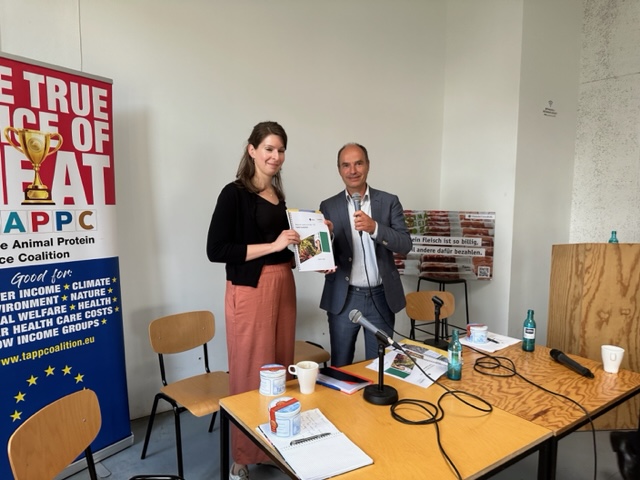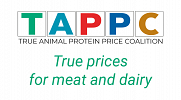Germans want to pay more for meat, dairy and eggs
New structure solves various issues at once without raising consumer expenses
A broad majority of 56% of the German consumers is willing to pay a higher price for regular meat and dairy in order to reduce prices of plant based or organically produced food. This was concluded in a representative Ipsos report commissioned by the True Animal Protein Price (TAPP) Coalition. The coalition presented an action plan of policy measures during an event in Berlin.
New VAT regulations called for: 0 % on vegetables and fruit, 19 % on animal products
In the plan of the TAPP Coalition, policy options are suggested to implement the necessary food pricing restructure. A starting point is applying a VAT of 19% on meat, dairy and eggs by 2025. Due to this rate prices will slightly increase, for instance €0,29 for a liter of milk and €0,68 for a pound of chicken. Consumers are compensated by a new 0% VAT on various products such as vegetables and fruit. As a result a well-filled shopping basket will remain the same price. According to CE Delft this structure will reduce greenhouse gas emissions and increase demand for plant based and organic food, enabling farmers to switch to organic and sustainable farming methods and have a better income. Tax rates can thus steer towards more realistic, true pricing with benefits for health, climate, animal welfare and quality farming; themes that matter to consumers according to Ipsos.
True Pricing for better quality and a fair income
True pricing is about including all real societal costs – such as biodiversity loss, greenhouse gas emissions and healthcare costs - in the price. The quality of meat and meat production, as well as a fair income for farmers make part of the reasoning behind true pricing.
Jeroom Remmers, director of the TAPP Coalition: “One of the misconceptions about true pricing is that it will make animal based protein les attainable, especially to lower income groups. This is debunked by this research: everybody is still very much able to buy what they fancy. In fact we are solving an issue that has been around for decades; healthy food will become more affordable for everyone at last”.
Consumer benefits
The plan helps to increase healthy food consumption and reduce red and processed meat consumption which will boost public health and reduce healthcare costs. As an extra, the government can opt for a calculated and proved method that will decrease food expenses overall. This can be achieved by following the example of countries like the UK giving consumers food vouchers of up to 200 UK pound (Healthy Start Food Vouchers) to reduce food expenses and boost healthier buying. This governmental add on will even further increase the positive effects of the core VAT switch plan. It will boost the purchasing power of consumers and stimulate a healthy intake of fruit and vegetables; results that will help achieve several set governmental plans for the coming years.

The TAPP Coalition handed the proposal and the research reports over to Christiane Seidel (Vzbv): “The vast majority of consumers want more sustainable and healthier food. Food prices must reflect what their sustainable production costs. As a result, prices would act more as an indicator of quality. All consumers must have the opportunity to afford a healthy and sustainable diet. Therefore, rising food prices must be cushioned by socio-political measures”, she concluded.
Read the full CE Delft report and IPSOS report.
About the TAPP Coalition
TAPP is a Dutch coalition of different but likeminded businesses, farmers, scientists and NGOs across the whole political spectrum, they agree on one thing: the importance of introducing true prices for meat and dairy. In the Netherlands the coalition has successfully put true pricing on the political agenda: 63% supports a true and slightly higher meat price provided the funds are used for the benefit of the consumer and the quality farmer. This has led to various responsible Dutch ministers backing the plan and further investigating it for implementation. Now the coalition is aiming to achieve the same active dialogue in Germany.
Media coverage in Germany and more background info can be read here.
The whole event is recorded by zoom: https://us06web.zoom.us/rec/share/-zDGHTXB7kuGqiomL9LCb3j2_KV_OuCZKYYdM9m5xSuZ9CqztDHVTzrTu5dkh-hc.nS4OdX7iTG4t1ks0?startTime=1684827071000
Password: %8usP$nB
In short the TAPP Coalition proposal
A. 0% VAT on fruit and vegetables and healthy/ sustainable food
a. The proposal entails that the VAT on fruit and vegetables is reduced to 0%. This rate will also apply to plant-based meat and dairy substitutes, nuts, bread, whole wheat products and organic food)
B. A fair, slightly higher price on meat including all costs
a. This can be realized with applying a fair meat price in 2030 with all environmental costs like CO2 being incorporated into the meat price. As a result, in 2030 chicken meat will become 14 eurocents more expensive per 100 gram and beef and pork will become 88 and 18 eurocents more expensive per 100 gram. This can be implemented by a new true meat price. Applying the normal (highest) VAT rate is another option with a lower price increase compared to the previous option.
C. Financial compensation for low income groups
a. For low-income households (20% lowest income groups) compensation is given, to make sure all consumers, poor or rich, can still afford to buy meat for its true price. This equals to 120 euro per year per capita for the 20% lowest income groups. This could be money or free food vouchers for healthy, sustainable food.
D. Subsidies for farmers
a. Livestock farmers receive at least 10.000 euro extra per year for producing with higher standards for animal welfare and/or sustainability. This amount compensates for the increasingly higher costs they have to incur to produce in a more animal friendly or environmentally friendly way (e.g., reduce CO2 emissions, or for reducing animals per stable for better animal welfare and reducing pollution).


